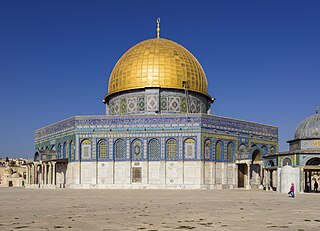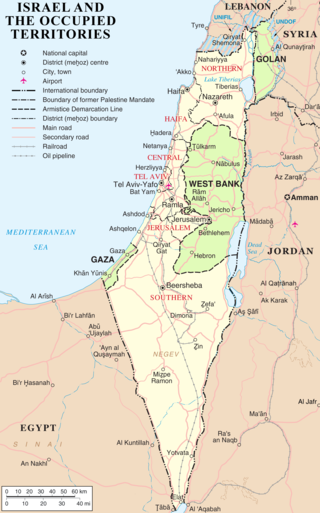
The Gaza Strip, or simply Gaza, is a political entity and the smaller of the two Palestinian territories. On the eastern coast of the Mediterranean Sea, Gaza is bordered by Egypt on the southwest and Israel on the east and north.

The Palestinian National Authority, commonly known as the Palestinian Authority and officially the State of Palestine, is the Fatah-controlled government body that exercises partial civil control over West Bank areas "A" and "B" as a consequence of the 1993–1995 Oslo Accords. The Palestinian Authority controlled the Gaza Strip prior to the Palestinian elections of 2006 and the subsequent Gaza conflict between the Fatah and Hamas parties, when it lost control to Hamas; the PA continues to claim the Gaza Strip, although Hamas exercises de facto control. Since January 2013, the Palestinian Authority has used the name "State of Palestine" on official documents, although the United Nations continues to recognize the Palestinian Liberation Organization (PLO) as the "representative of the Palestinian people".

The Israeli–Palestinian conflict is an ongoing military and political conflict in the Levant. Beginning in the mid-20th century, it is one of the world's longest continuing conflicts. Various attempts have been made to resolve the conflict as part of the Israeli–Palestinian peace process, alongside other efforts to resolve the broader Arab–Israeli conflict. Public declarations of the desire to see a Jewish homeland established in Palestine, including the First Zionist Congress of 1897 and the Balfour Declaration of 1917, created early tensions in the region after waves of Jewish immigration. Following World War I, the Mandate for Palestine included a binding obligation for the "establishment in Palestine of a national home for the Jewish people". Tensions grew into open sectarian conflict between Jews and Arabs. The 1947 United Nations Partition Plan for Palestine was never implemented and provoked the 1947–1949 Palestine War. The current Israeli-Palestinian status quo began following Israeli military occupation of the West Bank and Gaza, known as the Palestinian territories, in the 1967 Six-Day War.

The history of the State of Palestine describes the creation and evolution of the State of Palestine in the West Bank and Gaza Strip.

The Palestinian territories are the two regions of the former British Mandate for Palestine that have been occupied by Israel since the Six-Day War of 1967, namely the West Bank and the Gaza Strip. The International Court of Justice (ICJ) has referred to the West Bank, including East Jerusalem, as "the Occupied Palestinian Territory", and this term was used as the legal definition by the ICJ in its advisory opinion of July 2004. The term occupied Palestinian territory was used by the United Nations and other international organizations between October 1999 and December 2012 to refer to areas controlled by the Palestinian National Authority, but from 2012, when Palestine was admitted as one of its non-member observer states, the United Nations started using exclusively the name State of Palestine. The European Union (EU) also uses the term "occupied Palestinian territory". The government of Israel and its supporters use the label "disputed territories" instead.
West Bank and Gaza Strip may refer to:

Palestine, officially the State of Palestine, is a state located in the Southern Levant region of West Asia. Founded on 15 November 1988 and officially governed by the Palestine Liberation Organization (PLO), it claims the West Bank and the Gaza Strip as its territory, all of which has been Israeli-occupied territories since the 1967 Six-Day War. The West Bank contains 165 Palestinian enclaves that are under partial Palestinian rule, but the remainder, including 200 Israeli settlements, is under full Israeli control. The Gaza Strip was governed by Egypt but conquered by Israel in 1967. Israel governed the region until it withdrew in 2005. Hamas seized power after winning the 2006 Palestinian legislative election. The Gaza Strip has since been blockaded by Israel and Egypt.

Between 1953 and 1967, the present-day Gaza Strip was occupied and governed by Egyptian armed forces of the United Arab Republic (UAR). The Egyptian occupation of Gaza began with the inception of the territory in 1949 following the First Arab–Israeli War, and ended after Egypt's defeat to Israel in the Third Arab–Israeli War of 1967, after which the Israeli Military Governorate commenced. Egyptian rule in Gaza before the 1967 war had been continuous with the exception of a brief period from October 1956 to March 1957, when Israel invaded and occupied Gaza as well as the Sinai Peninsula during the Suez Crisis.

The economy of the State of Palestine refers to the economic activity of the State of Palestine.

Israel has occupied the Palestinian territories and the Golan Heights since the Six-Day War of 1967. It used to occupy the Sinai Peninsula and southern Lebanon as well. Prior to Israel's victory in the Six-Day War, occupation of the Palestinian territories was split between Egypt and Jordan, with the former having occupied the Gaza Strip and the latter having annexed the West Bank; the Sinai Peninsula and the Golan Heights were under the sovereignty of Egypt and Syria, respectively. The first conjoined usage of the terms "occupied" and "territories" with regard to Israel was in United Nations Security Council Resolution 242, which was drafted in the aftermath of the Six-Day War and called for: "the establishment of a just and lasting peace in the Middle East" to be achieved by "the application of both the following principles: ... Withdrawal of Israeli armed forces from territories occupied in the recent conflict ... Termination of all claims or states of belligerency and respect for and acknowledgment of the sovereignty, territorial integrity and political independence of every State in the area and their right to live in peace within secure and recognized boundaries free from threats or acts of force."
Palestinian people or Palestinians are an ethnonational group descended from peoples who have lived in Palestine.

Demographic features of the population of the area commonly described as Palestinian territories includes information on ethnicity, education level, health of the populace, economic status, religious affiliations and other aspects of that population.

The Palestinian Authority Passport is a passport/travel document issued since April 1995 by the Palestinian Authority to Palestinian residents of the Palestinian territories for the purpose of international travel.

The Oslo Accords are a pair of agreements between Israel and the Palestine Liberation Organization (PLO): the Oslo I Accord, signed in Washington, D.C., in 1993; and the Oslo II Accord, signed in Taba, Egypt, in 1995. They marked the start of the Oslo process, a peace process aimed at achieving a peace treaty based on Resolution 242 and Resolution 338 of the United Nations Security Council, and at fulfilling the "right of the Palestinian people to self-determination". The Oslo process began after secret negotiations in Oslo, Norway, resulting in both the recognition of Israel by the PLO and the recognition by Israel of the PLO as the representative of the Palestinian people and as a partner in bilateral negotiations.
The Palestinian Declaration of Independence formally established the State of Palestine, and was written by Palestinian poet Mahmoud Darwish and proclaimed by Yasser Arafat on 15 November 1988 in Algiers, Algeria. It had previously been adopted by the Palestinian National Council (PNC), the legislative body of the Palestine Liberation Organization (PLO), by a vote of 253 in favour, 46 against, and 10 abstaining. It was read at the closing session of the 19th PNC to a standing ovation. Upon completing the reading of the declaration, Arafat, as Chairman of the PLO, assumed the title of "President of Palestine." In April 1989, the PLO Central Council elected Arafat as the first President of the State of Palestine.

The All-Palestine Government was established on 22 September 1948, during the 1948 Arab–Israeli War, to govern the Egyptian-controlled territory in Gaza, which Egypt had on the same day declared as the All-Palestine Protectorate. It was confirmed by the Arab League and recognised by six of the then seven Arab League members, with Transjordan being the exception. Though it claimed jurisdiction over the whole of the former Mandatory Palestine, its effective jurisdiction was limited to the All-Palestine Protectorate, which came to be called the Gaza Strip. The President of the protectorate was Hajj Amin al-Husseini, former chairman of the Arab Higher Committee, and the Prime Minister was Ahmed Hilmi Pasha. The legislative body was the All-Palestine National Council.
The Arab–Israeli war normally refers to:

The All-Palestine Protectorate, or simply All-Palestine, also known as Gaza Protectorate and the Gaza Strip, was a short-lived client state with limited recognition, corresponding to the area of the modern Gaza Strip, that was established in the area captured by the Kingdom of Egypt during the 1948 Arab-Israeli War and allowed to run as a protectorate under the All-Palestine Government. The Protectorate was declared on 22 September 1948 in Gaza City, and the All-Palestine Government was formed. The President of the Gaza-seated administration was Hajj Amin al-Husseini, the former chairman of the Arab Higher Committee, while the Prime Minister was Ahmed Hilmi Pasha. In December 1948, just three months after the declaration, the All-Palestine Government was relocated to Cairo and was never allowed to return to Gaza, making it a government in exile. With a further resolution of the Arab League to put the Gaza Strip under the official protection of Egypt in 1952, the All-Palestine Government was gradually stripped of its authority. In 1953, the government was nominally dissolved, though the Palestinian Prime Minister, Hilmi Pasha, continued to attend Arab League meetings on its behalf. In 1959, the protectorate was de jure merged into the United Arab Republic, while de facto turning Gaza into a military occupation area of Egypt.











